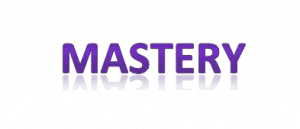Mastery Learning
CompetencyWorks Blog
 Competency education didn’t just pop out of the woodwork as a new reform. It’s been built upon many other reforms, learning from each and integrating them into the systemic reform that is now being adopted across the nation. One of the building block reforms is mastery learning.
Competency education didn’t just pop out of the woodwork as a new reform. It’s been built upon many other reforms, learning from each and integrating them into the systemic reform that is now being adopted across the nation. One of the building block reforms is mastery learning.
In one of her presentations, Rose Colby identifies some of the key features borrowed from mastery learning and the enhancements that are expected in a competency-based system. Mastery learning includes diagnostic pre-assessment with pre-teaching; high quality group-based instruction; progress monitoring through regular formative assessment, corrective instruction and practice; and enrichment activities when students have reached mastery.
The three major enhancements seen in competency education that were not present in mastery learning are:
1) It is often too difficult for individual teachers to manage the differentiated support for students, and it is often logistically so challenging that students aren’t able to get the help they need. In competency education, providing supports to students that are “not yet proficient” at the end of a unit (however that may be defined) is a school-wide function, not an individual teacher responsibility. Schools are organizing themselves to offer opportunities for supports each day, throughout the module or course, and built into the school year. See The Learning Edge: Supporting Student Success in a Competency-Based Learning Environment.
2) Mastery learning did not embrace the depth of knowledge that is now embraced in our overall education policy. Our emphasis on deeper learning through performance tasks that embed the Common Core Standards and college- and career-ready skills drives greater emphasis on the application of learning and high quality assessment systems.
3) There was a risk that mastery learning could degenerate into an independent study model with students having folders of their learning. That same risk can be seen today by schools that claim click-through credit recovery courses are competency-based. They aren’t – students don’t have the opportunity to demonstrate application and deeper learning. We now understand that there are many design choices in how schools and teachers implement competency education. Certainly highly individualized models are possible, but most schools see value in students collaborating and creating a community of learners by keeping cohorts of students together, and in making sure students are staying on-pace or are following a plan that will get them back on-pace.
It’s pretty amazing that mastery-based learning produced positive results, even with its earlier stage of reform that was solely classroom based without the systemic approaches of competency education, such as greater flexibility in school design, changes in organizational capacity, and policy changes. Below are some of the findings from a review of 27 evaluations of mastery-based learning in Synthesis of Research and The Effects of Mastery Learning in Elementary and Secondary Classrooms by Thomas Guskey and Sally Gates published in 1986:
• Achievement results are overwhelmingly positive, but vary greatly from study to study.
• Although students at all levels appear to benefit from mastery learning, effects are somewhat larger in elementary and junior high school classes than at the high school level.
• Although applicable across subject areas, effects in language arts and social studies classes are slightly larger than those attained in science and mathematics classes.
• Students tend to retain what they have learned longer under mastery learning both in short-term (2-3 weeks) and longer-term (4 months) studies.
• Students are engaged in learning for a larger portion of the time they spend in mastery classes and require decreasing amounts of remedial (corrective) time over a series of instructional units.
• Students in mastery classes develop more positive attitudes about learning and about their ability to learn.
• Teachers using mastery learning develop more positive attitudes toward teaching, higher expectations for students, and greater personal responsibility for learning outcomes, but may experience diminished confidence in their teaching skills.
I’ve heard this last point of diminished confidence in teaching skills from teachers in schools in several states. They all say that it is the sense of accountability to improve their teaching skills that has contributed to the collaborative culture of working with their colleagues that is based on student work.
Does anyone have thoughts/research to share on other approaches that inform competency education – outcome-based, standards-based, or youth development?